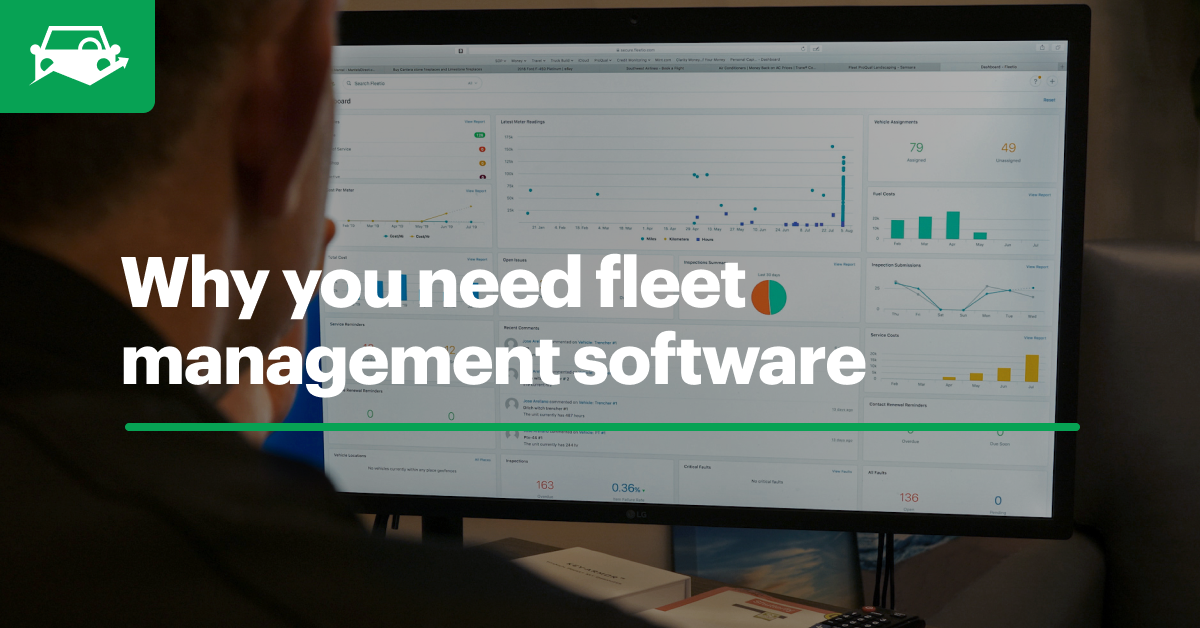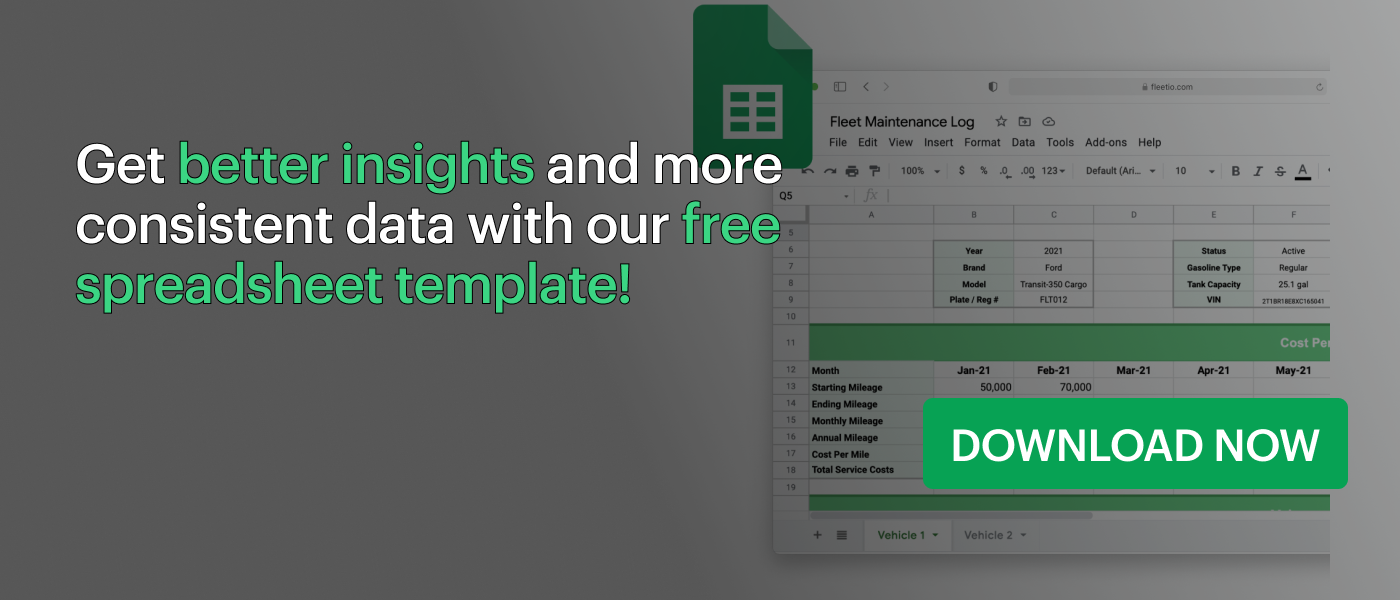Simply put: Yes. But let’s dig into the potential benefits fleet management software can have in store for your fleet.

To say that the fleet landscape is changing rapidly would be a severe understatement, with developing technologies and new management procedures emerging constantly. For fleet managers who have been in the industry for a while, it can seem impossible to keep up with trends and distinguish what to adopt into their fleet management systems, and what to ignore.
Fleet management software is one of those innovations that showed up in the fleet scene and made a huge impact, quickly growing into its own industry since its first implementation in the late 90s. Almost three decades later, fleet management software has solidified its longevity, and there are a ton of providers to choose from, with each platform offering its own unique capabilities, user interface and integrations.
Despite the growth and advancement of the software over the years, many companies still rely on more antiquated methods to keep up with their fleet. While these methods can be incredibly useful in the hands of a diligent fleet manager, their inevitable shortcomings could eventually become a massive detriment to any operation.
Whether you’re hesitant to give up a tried-and-true system or you’re wary of software-based solutions, there’s more than a few reasons to consider switching to a fleet management software.
So what does fleet management software do?
In short, fleet management software takes all of the processes fleet managers and drivers have traditionally completed by hand and streamlines them into a single platform that can be easily accessed by any stakeholder at any time. It can combine individual facets of fleet management – GPS tracking, telematics data , fuel expenses, business calculations, inspections, etc. – for full immediate visibility, as well as automate certain tasks and notifications for a more hands-off approach to data and communication.
All of that functionality may seem well and good at first glance. But if you’re a thorough fleet manager who has developed your own time-tested, proven system on paper, it may prompt you to ask: “If it ain’t broke, why should I fix it?”
Having any formalized system to manage your fleet, let alone making it work for you over time, is definitely an accomplishment, so more power to you! But you could be creating more work for yourself than necessary while sacrificing important insight and measurements that a good fleet management software could be generating automatically.
The great thing about fleet management software is that they can handle a lot more calculations in a much shorter period of time – almost instantaneously – than the average fleet manager, and can quickly account for errors you might not have been able to notice on your own. Just connect your accounts, configure a couple settings, and you’re up and running in no time.
Fleet management software can also be used from a desktop computer, smartphone or tablet, which allows you to enable notifications when things like inspections or work orders are submitted, or when a diagnostic trouble code (DTC) comes through on a vehicle. When you combine the speed, accuracy, immediacy and accessibility of a software-based solution, you end up with a far more foolproof system for getting a comprehensive perspective on what’s happening with your fleet than even the best paper forms can provide.
Let’s take a deeper look at the benefits of a fleet management software:
1. It does more than just track vehicles.
One of the common misconceptions about fleet management software is that its primary use is just keeping track of the assets in a fleet. While that is an important and necessary function, that perception undercuts the impact other software features can have on an operation.
Fleet management software not only allows you to organize all of your assets in one place, but also begin to quantify the health of those assets over time. You can compile data around mileage, hours of service and inspections, as well as create preventive maintenance schedules and corresponding notifications that allow for the most uptime possible, while still getting your vehicles the service they need when they need it.
As you track vehicle health over time, you can take that same data and analyze your fleet from a financial standpoint. Fleet management software can automate reports around vehicle utilization, total cost of ownership (TCO) and expenses so that you get to prioritize your company’s bottom line as well as your assets.
The variety of integrations that can be utilized in a fleet management software extends its power as an analytical tool. Connecting your GPS and telematics devices lets you keep tabs on driver behavior, idle hours and route optimizations, and fuel card integrations help you stay aware of fuel purchases and ahead of potential theft.
Another common misconception – fleet management software doesn’t have to mean just tracking vehicles! Many fleet management softwares include features that let you track stationary equipment and power tools so that all of your assets are accounted for.
The most significant effect a fleet management system can have is the ability to see all of these measurements in a singular setting, uniting all of your data for a more comprehensive picture of what’s happening in your fleet. It goes far beyond simply tracking your vehicles – it can become a powerful resource for seeing your fleet from all sides.
2. It keeps your drivers – and vehicles – safer.
Safety should always be a top priority for any fleet, considering the inherent risks drivers face on the road every day. Fleet management software can help mitigate some of those risks from the outset as well as create some protection for when accidents do occur.
With GPS and telematics data synced in your platform, you can easily monitor driver behavior to encourage your drivers to take the right actions to keep themselves safe on the road. Poor driving habits can also affect the safety of your vehicles, so fleet management software can mean ensuring the vehicles’ safety from driver-induced wear and tear as well, which keeps your drivers safe in the process.
Being able to keep a traceable record of vehicle services and inspections lets you catch potential issues before they happen, which keeps assets in good working condition more consistently and prevents them from becoming potential liabilities to your drivers. Also, those records can become a legal lifesaver in the event of a lawsuit following an incident, and can even aid you in adhering to vehicle warranties.
Most fleet management softwares have different user profiles that you can assign to each of your drivers. You can not only make it simpler for them to submit daily vehicle inspection reports (DVIRs) and work orders, but also store their information for easy accessibility on the road, like necessary licenses, certifications or insurance, in the event of an accident.
3. It makes audits and compliance so much easier.
Most fleets have to deal with some level of oversight in order to keep their operation running. Nothing is worse than hunting down all the necessary documents when the auditors come knocking and finding that some are missing when you need them the most.
Fleet management software makes it easy to remain compliant in the same way it can help protect you from legal repercussions – solid record keeping. When it comes time for an audit, or events like CVSA Roadchecks come up, it’s important to have all of your documentation squared away and ready to go to make the process as quick and seamless as possible.
An easy way to stay prepared for audit is to use software to implement electronic DVIRs (eDVIRs), which can be more easily maintained and stored than a traditional paper inspection. Drivers can complete simple, thorough eDVIRs in a mobile fleet management app and instantly upload results into a centralized system, saving time in both the inspection process and response to reported issues.
If you have specialized regulations specific to your fleet or industry that you have to comply with, like emissions standards or ELD requirements, fleet management software can make it a lot easier to maintain the information in a way that lets you analyze the output in your day-to-day operations while having a demonstrated record for officials when needed.
If you want to update your paper processes but still aren’t ready to make the leap into software, try a new spreadsheet solution instead. Our free downloadable spreadsheet template can give you a little more insight into your fleet metrics without having to set it up yourself – plus, when you’re ready for a software solution, all of these templates can easily be imported into Fleetio to give you even more visibility into your operations.
It’s time to make the move away from paper. Start your free trial or request a demo of Fleetio today!




